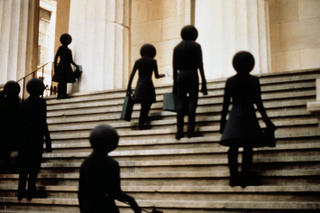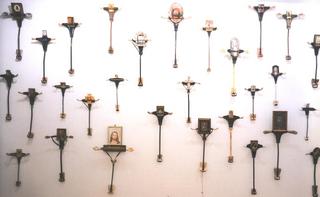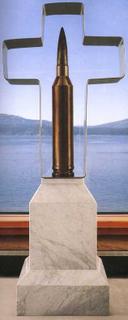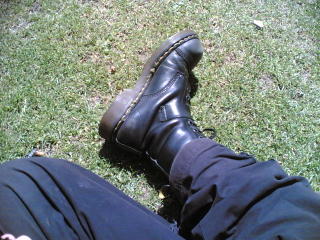Art is a strange thing.
The same piece of work can invoke a myriad of reactions in people, possibly with no two people quite seeing the same thing the same way. Some art brings out the thoughtful scholar whilst other boils the blood of the hateful mob.
I think I have a pretty liberal view where art is concerned. I'm just as at home with paintings, prints, sculpture, installation, performance, modern or classical, direct or oblique. I can enjoy a Dali, a William Blake, an Enim, a Hurst or a Kapoor.
I think the thing that keeps me curious and interested about this sort of thing is that I realised many years ago that not liking or understanding a piece doesn't make it bad or wrong - just that it's something you don't get. To my mind all art is created from the artists subjective view of things so it's no surprise that it's hard to truly take an objective view of what it is or where it comes from.
When I see art I like though, I know it.
This brings me to today, and my visit to the
Baltic Centre for Comtemporary Art.

The Baltic - today.
I'd actually gone there to mainly see part of the "History of Disappearance", a selection from
the Franklin Furnace archives. Taken from live art ranging from 1975 to the present it included something I'd seen many years ago that had long since stuck in my mind - a work called "The Pedestrian Project" by Yvette Helin. Of course, at the time I had no idea what it was, just that it was people dressed as those figures seen on washroom doors - very odd but very memorable.

The Pedestrian Project
Moving through city streets, mixing prearranged routines with spontaneous movement, they stood for the anonymous nature of people, how things merge into one in amongst the bustle of daily life. The twist is, of course, that when you put a style of figure seen every day in an environment known like the back of your hand it stands out and becomes
extraordinary.
It was really good to watch the whole piece finally, including some behind the scenes footage of the suits getting prepared and fitted.
As good as that was, though, it wasn't the thing that really caught me. What did was one of the best things I've seen in many years and has really fired me up to find out more. I'll most likely go back agin in the next week or two.
Over two floors, also including a viewing gallery overlooking one of them, is the Kienholz exhibition - work from
Edward and Nancy Reddin Kienholz.


I'd heard the name before but never seen anything by them. Now I have I'm very glad - there was stuff in there which I'll remember for a long time to come.
How to describe it, in theme and style, is very hard. As I mentioned before I find art to be a very subjective thing so my view of it is just that - what I've taken from it.
Imagine a mix of 50's circus sideshow, the beauty of found art, sharp sexual and political comment and a capturing of both a zeitgiest and nadir of Americana as viewed from the inside. It is really, truly tough to explain what some of the pieces feel like or the emotion they seem to invoke.
There are a couple of pieces which draw you in and implicate you into their world. One -
"The Bear Chair" - turns a childs teddy bear into a figure of sexually predatory menace over a small female figure made of various doll parts. When you first enter the small room it's located in you are somewhat let down and it seems nothing special - the full situation is only realised when a sentence scratched into the desk is read on moving in close to the piece. By that point you're there, in amongst it, and too late to get away again. It goes from being an initial let down to horribly chilling - even now the hairs are standing up on the back of my neck as the thought of the actual subject matter it covers hits home again.
I can't bring myself to include a picture here but just knowing the phrase used is enough in itself:-
IF YOU EVER TELL I'LL HURT YOUR MAMA REAL REAL BADOther pieces include 73 versions of Jesus on the cross, spanning a whole wall of a gallery, each made of pram parts and other found objects from around the world.

76 JC's Led The Big Parade
A large number of the items over the many areas are war related, stretch from the first world war through to Vietnam, and Hitler through to the nature of war itself.

The Big Double Cross
"The Ozymandias Parade" is a huge tableaux mounted on a giant flashing arrow, skeletal bastardised figures of a generic President and vice-President caught up in a chaos of a bolting horse. Tiny third-world figures flank them and within the melee there are allusions to nuclear threat, US poverty and futility.
It sounds bleak and disaffecting but totally captures your attention and holds you, much like every other piece there.

The Ozymandias Parade

{detail}
A skewed fairground ride,
"The Merry-Go-World Or Begat By Chance And The Wonder Horse Trigger", saw me spinning a wheel and once inside seeing my possible other life have being that of a small black girl in bleak poverty. You go in chuckling at the lights and come out with a totally changed mood. This is work as both art and comment, but with neither getting in the way of the other.

The Merry-Go-World

The Caddy Court
"The Caddy Court" sees a version of the US supreme court lodged in the middle of, as the name suggests, a 1978 Cadillac. Odd touches are subtley hidden around the car but pulling aside the curtains on the court itself sees you face to face with nine justices in skeletal and animal form, dark and merciless. Again you find yourself drawn in on one pretext and spat out with another, implicated into the Kienholz world without recourse.

The Hoerengracht

It's Not My Fault
These are only a small part of what is on offer and those in the northeast of England should take the chance to go and experience this slice of other peoples heads before it finishes at the end of August and relocates to Sydney, Australia, in December.
Sometimes you seek art out because you know it's what you'll like.
Other times, like this, it finds you and grabs you.....and I'm very glad it has.
















